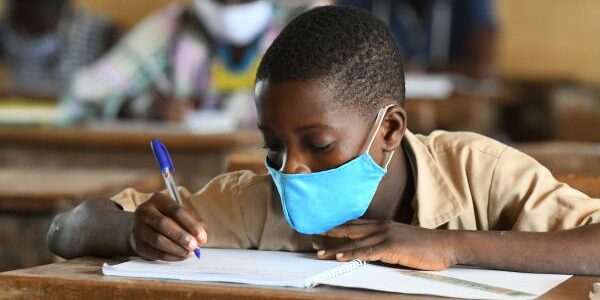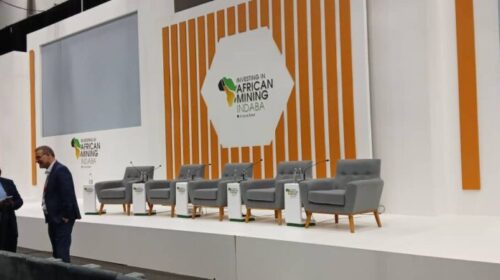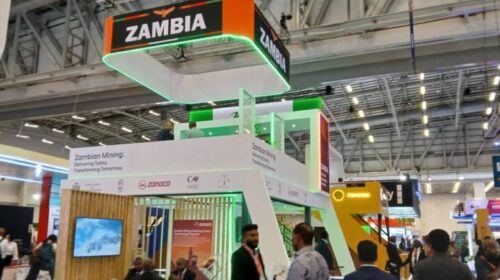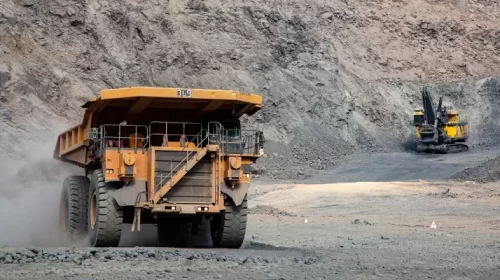FQM is sending school to children | Zambia
FQM Kansanshi’s School-on-Radio initiative is making waves.
With almost four million school-age children in Zambia forced to stay at home since closures to prevent COVID-19’s spread began in mid-March, the disruption to these children’s education cannot be overstated. Government e-learning schemes and television programming may have mitigated some of the damage in privileged households, but Zambia’s rural population is most at risk of getting left behind.
First Quantum Minerals (FQM) saw the warning signs and, through its Kansanshi Foundation and a partnership with the Solwezi District Education Board, launched the School-on-Radio initiative on 1 June 2020, aimed at bridging the education gap among primary school-going children. The radio schooling programme was initially scheduled to run until 31 July, but has been such a welcome addition to the otherwise unstructured daily lives of children during lockdown that the Solwezi District Education Board (DEB) and FQM Kansanshi have decided to extend it.
Mining For Zambia spoke to Dr Onward Mandebvu, the facilitator of the School-on-Radio programme, to find out more.
What are the School-on-Radio programme’s goals?
When Zambia’s Government closed the schools as part of the national lockdown we saw a need to reevaluate our social investment and educational programmes. We realised that, with schools closed, there would be a huge gap in students’ education. Although Government introduced TV school and e-learning, the majority of people living in the countryside don’t have access to the national power grid, and there is very little TV penetration in the rural parts of the country, so we decided to assist in that regard. Radio is the means of reaching the rural population, so in April this year, we began planning the programme as one of FQM Kansanshi’s responses to the COVID-19 pandemic.
Tell us more.
We went on air from 1 June. The provincial radio station we’ve partnered with, Solwezi FCC Radio, reaches about 50% of people in North-Western Province. The radio station covers a large part of Kalumbila district [thereby reaching the communities that surround FQM’s Kalumbila operations too.]
It goes far beyond the communities surrounding the mines, in fact.
Yes, our goal is to reach approximately 150,000 children in North-Western Province who would have otherwise been at home, playing from sunrise to sunset.
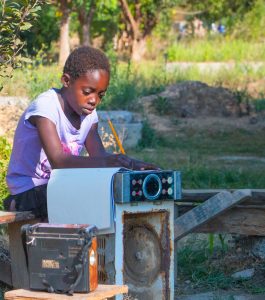
Tell us about the partnership between the Solwezi Education Board and FQM Zambia.
Once we had committed to exploring [and investing in] the idea, we took it to Government. We proposed that we run this programme in response to the shutdown of schools, and the DEB were very excited and grateful; they embraced the idea.
One of our core principles as a company is that we are not the duty bearers of service delivery. Rather than supplant a duty bearer, when we intervene, we try to involve them in the areas where they are the experts. We aren’t experts in primary school teaching, but we did have the idea and the financial resources.
What role does the DEB play in the programme?
Their role was to select the teachers to take part in the programme, and then to ensure that the lessons are run according to the national primary school curriculum. The DEB also has officers who oversee teachers’ lesson preparation, to ensure it meets acceptable standards before they go on air.
What is FQM Kansanshi’s role?
FQM Kansanshi is responsible for financing the programme, and ensuring that the lessons are aired. We have also taken the opportunity to enhance the participating teachers’ capacity to teach better.
What costs are involved in financing the programme?
The biggest cost is buying the airtime. Solwezi FCC Radio gave us a 42% discount on their standard rates for the airtime, but the airtime is still the biggest budget item. We have lessons for Grades 1-7 running every weekday, five days a week. Each lesson is 30 minutes long, and there are four subjects for Grades 5-7.
It’s been amazing that this radio station was able to rearrange their programming to create the time for School-on-Radio. We are currently using 50% of their airtime!
Why Solwezi FCC Radio?
Solwezi FCC Radio is a private Christian-based radio station which also has a significant community evangelisation mission. In that respect, the radio station has distributed pre-tuned radio sets to hundreds of households in the province. So we know that there is a large number of families that have radio units which, in this case, can be used for the school lessons. Solwezi FCC Radio also has a longstanding relationship with Kansanshi Mining Plc. Our health, our education, community relations, and public relations teams are often on air. We were fortunate to be able to further an existing relationship.
“It’s been amazing that this radio station was able to rearrange their programming to create the time for School-on-Radio. We are currently using 50% of their airtime!”
Are there any other costs that FQM Zambia is covering?
We also provide allowances for the teachers. They are Government teachers, but they have to travel to the station every day, so we cover their transport costs and give them some compensation. The teachers are actually very excited to be given the opportunity to be part of this project. Suddenly they are on air and are becoming local celebrities! Their families and friends and relatives listen in… It’s been a positive experience for the teachers as well.
It’s the DEB that selects the teachers, and works with them to pre-approve the lessons, as you’ve explained, Dr Mandebvu. Tell us about your personal involvement.
I am responsible for the whole programme, from design, development and implementation, to evaluation. The radio station records the lessons in advance, and then airs them at the given time. At the implementation level, I spend a lot of time listening in to the lessons from my office every day, as a way of ensuring that what’s going out on air is high quality. Where I see opportunities for improvement, I make notes — and the DEB’s authorities do the same — and we exchange feedback to ensure ongoing quality improvement.
What feedback have you received from learners and their parents?
We haven’t yet carried out a formal evaluation of the programme, but we do have people phoning in from different parts of the province saying that we are doing a fantastic job. I’ll give you one particular example. A lady who is planning to re-sit her O Levels in English Language later this year approached me to say how incredibly helpful she has been finding the lessons. Although they are meant for primary school level, someone doing their O Levels who needs to understand adverbs or adjectives [and the various grammar in the curriculum] has also found the lessons helpful.
Have you run any interactive lessons via radio so far?
Yes, after a few weeks of starting the programme, we decided to run live lessons where learners could phone in to respond to questions asked by teachers. The radio station was jammed with calls! We will definitely make this a regular part of the programme, so the teachers can check that there are listeners out there, and that the teaching is successful.
Do the learners need to call a local phone number to reach the radio station?
We take care of the cost of the calls. The callers just need to give a missed call to the radio station; the cost of the calls would otherwise be a barrier.
It sounds as if you’ve thought of everything.
Well, if the world was perfect, we would try to make sure all families out there had their own radio units and that they also had phones to call in. But there’s only so much that we can do — especially as this an emergency response. We’re trying our best…
Do you see value in this programme, apart from ensuring that learners keep up with the national school curriculum?
The programme definitely has value that goes far beyond the one or two hours that kids spend daily, listening to the radio lessons. There are enormous life lessons that are coming out of participating in this. These kids have to organise their time, they have to prioritise what to do, what not to do, and at what time of the day. They also have to engage in independent learning and study at home in preparation for the next lesson — there’s no teacher there to supervise them.
What about the impact on literacy levels?
When a child loses months of school learning and is spending time out there in the community without any formal learning, there’s a significant loss in their literacy levels — and they may never recover from this. School-on-Radio is helping to retain certain fundamental skills, as well as ensuring that they receive the national school curriculum — just through a different means. One could even argue that the programme develops life skills better than formal school because of the autonomy that the kids have.
“School-on-Radio is helping to retain certain fundamental skills, as well as ensuring that they receive the national school curriculum.”
We are aware that literacy levels in Zambia are not very high and, in FQM Kansanshi’s regular educational support programmes, we have a number of interventions that are aimed specifically at raising primary school children’s literacy levels. Thanks to the enthusiasm of the District Education authorities, the radio lessons for the first four grades (1-4) focus on integrated literacy. The learners do their Science, their Maths, and so forth, but within a literacy-focused lesson. [In contrast], Grades 5-7 have lessons in English, Science, Mathematics, and Social Studies.
The School-on-Radio programme was due to run from 1 June until 31 July. Is it now being phased out?
No, the feedback has been so positive that the programme is still running as before. In fact, we are looking at continuing School-on-Radio even after the end of the pandemic because it could turn into a useful resource for providing additional tuition in subjects like Mathematics and Science.


